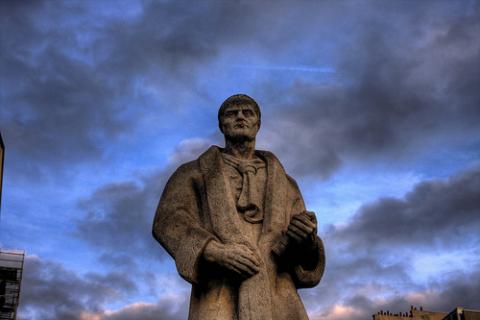Rousseau's distrust of representative democracy was well-founded

The idea of democracy was to make the people sovereign but its modern trajectory has been to make people subjects again. By Vincent Browne.
A former “best friend” described him as “false, vain as Satan, ungrateful, cruel, hypocritical and wicked”. He arranged for his five children to be given over to a foundling hospital immediately after their birth. He was vain, truculent, obsessive and solitary.
He changed his religion several times, probably opportunistically. And yet when he died he was one of the most admired people in his country of residence, and his remains were later moved to a distinguished resting place in the nation’s capital. His ideas were among the most formative of his and later ages.
This was Jean-Jacques Rousseau, a native of Geneva and one of the philosophers whose writings inspired the French Revolution and, later, the struggle for liberty and equality around the world. He was an authority on music, a composer of operas and a writer of fiction and of some of the most influential works ever on political philosophy. His central ideas remain profoundly relevant, not least in Ireland right now.
Among those ideas is the contention that private property is iniquitous. He wrote: “The first man who, having enclosed a piece of ground, thought up the statement ‘this is mine’ and found people simple enough to believe him...was the real founder of civil society.” And for him that civil society was exploitative and unjust. He insisted “the fruits of the Earth belong to us all and the Earth itself to nobody”.
That identification of private property as the root of inequality is/was crucial and challenged directly a then prevalent view, attributed to English philosopher John Locke, that private property was a “natural right”. Unhappily, Locke’s view has prevailed in our culture, where the “right” to private property is viewed as close to sacrosanct. Hence the embedded view that what we “earn” is ours and ours alone, even though what we “earn” is derived from social interactions and is determined almost entirely by the arbitrariness of market forces.
It was because of private property that Rousseau was able to begin his most influential work, The Social Contract, with the dramatic opening line: “Man is born free and everywhere he is in chains.” Another memorable contribution to political philosophy was his idea of the sovereignty of the people. There was always the tension between the “sovereign” and “subjects”. He resolved that tension with the idea that the people themselves were the sovereign and, at the same time, subjects. Thereby, in a sense, they were subject to themselves, which Rousseau believed to be the essence of liberty.
The idea of the people being sovereign is part of our political jargon, but Rousseau had a far stronger notion of what was meant by “a sovereign people” than is nowadays commonly allowed. It was that the people themselves decide on all the fundamental issues of their society, deciding on the basis of the common good, not on the basis of their factional self-interests. He regarded representative democracy, the version of democracy we have here and that prevails throughout most of the world that is called democratic, as a corruption of the people’s sovereignty for it removed them from decision-making, except at periodic elections when they were momentarily free, and thereafter, once more, mere subjects.
I think his distrust of representative democracy was well-founded, for we see in our own country and elsewhere sovereignty is sub-contracted to a political class which decides on all major issues. Here these include the bank guarantee of September 2008, which has had such disastrous consequences for our society, and the surrender of sovereignty to the troika in December 2010.
But the degradation of sovereignty is more profound than that. During the fiscal treaty referendum campaign Simon Coveney, who was managing the Fine Gael campaign, casually dismissed reports the newly elected president of France, François Hollande, was promising to renegotiate the fiscal treaty – he said there was a parliamentary election campaign under way in France and one couldn’t treat election promises seriously. The implication here was that even where the people have this attenuated exercise of sovereignty, it in fact means nothing at all because they are voting on a bogus basis.
Even on the odd occasion when our “rulers” defer to us by way of a referendum it is done regretfully and condescendingly, and then, where possible, coercively, as with the fiscal treaty referendum.
But even more so, the sovereignty of the people is hollowed out almost entirely by the relentless encroachments of the EU into the arena of our national sovereignty. As I am writing this, there is a report on the radio on the imminence of initiatives to give the EU indefinite discretion over banking and budgetary policies and what is called a “political union” which no doubt will involve even more encroachment.
The idea of democracy was to make the people sovereign. The modern trajectory of democracy has been to make people subjects again – a condition Rousseau argued was an abrogation of sovereignty.
Jean-Jacques Rousseau was born in Geneva 300 years ago tomorrow, on June 28th, 1712. {jathumbnailoff}
Image top: Aldor.
